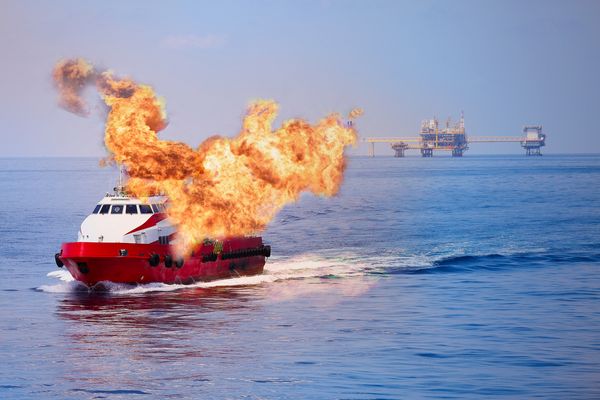Fire is devastating on a ship, especially on vessels or rigs with flammable materials. Offshore fire suppression systems and professional protocols are essential to protecting the lives of passengers and crew. Often, it’s the responsibility of the vessel or rig supervisor to ensure that the fire suppression equipment is in good working order and that all crew members know how to use it.
Burns are one of the most devastating types of injuries, with a long, painful healing process and no guarantee that the victim will fully recover. If you’ve been injured in an offshore fire, the help of a Houston offshore accident attorney is essential.

Fire protection, detection, and extinction regulations
Although each country sets its offshore fire prevention and safety regulations, there are also international requirements for fire detection and extinction on board vessels. Chapter 11-2 of the International Convention for the Safety of Life at Sea (SOLAS) addresses comprehensive vessel requirements. In 2002, it was revised to incorporate technological advances in vessel and offshore oil rig fire protection.
These regulations aim to prevent fires from occurring, ensure rapid fire detection, and proper methods to contain and extinguish the fire. In an offshore platform fire, the chances of a small spark turning into a deadly blaze are high.
General SOLAS regulations apply to ships built after July 1, 2002, and cover general regulations, ship construction, preventing an offshore rig fire or explosion, and appropriate fire suppression techniques and materials.
Highlights of offshore fire suppression from SOLAS include:
- Preventing the ignition of flammable liquids and combustible materials
- Limiting fire growth in every space of the rig or vessel
- Reducing hazards from smoke or fumes generated from burning toxic products
- Providing adequate fire detection equipment and provisions for an alarm to alert those aboard to escape or commence fire-fighting activities
- Methods for controlling the spread of smoke
- Containment of fires, containing fires in their space or origin
- Preserving structural integrity of the vessel or rig
In general, the vessel or rig owner is responsible for ensuring it’s constructed according to current safety standards and equipped with the right kind of fire extinguishment, including the proper fire extinguishers (those appropriate for fighting oil fires).
Vessel and rig supervisors are also responsible for ensuring the equipment is properly maintained, and all crew members are trained according to their roles for proper use.
Requirements for vessel supervisors
Both owners and operators share responsibility for preventing and containing fires. Should a passenger or worker get hurt in a fire, both parties may share liability for the harm caused.
Key requirements to reduce the chances of a ship fire or rig explosion include:
Fire safety training
All crew members should undergo comprehensive fire prevention training, covering proper use of firefighting equipment, evacuation routes and protocols, and communication during a fire or explosion emergency.
Installing an adequate fire detection and suppression system
Effective fire detection systems include heat and smoke detectors. They should be regularly tested to ensure they work. Fire suppression systems should include sprinkler systems (with the appropriate chemicals) and fire extinguishers located strategically, in easy reach, around the rig or vessel.
Proper storage and handling of combustible materials
Combustible materials are everywhere on an oil rig; all flammable materials should be securely stored, including proper labeling and segregation. All crew members must be trained in the proper handling of flammable materials.
Maintaining a safe electrical system
Electrical fires can happen on any vessel. The installation and maintenance of electrical systems should follow current codes and only be completed by a licensed electrician with training in proper grounding and insulation for vessels and rigs.
Hot work permitting protocols
Activities like welding, grinding, or cutting—and other “hot” work—should only happen according to strict safety guidelines. This properly prepares the area, places resistant protections around it, and has fire watch personnel supervise the hot work to identify sparks or other dangers swiftly.
Maintenance, inspection, and “good housekeeping”
Rig and vessel operators should schedule regular inspections of fire protection systems and conduct regular training and evacuation drills. Any deficiencies or damage should be promptly addressed, preventing injuries from malfunctioning fire suppression equipment.
Preventing injury requires keeping the vessel or rig in good condition, properly storing flammable materials, and creating a culture of safety and awareness.
Have you been hurt in an offshore fire? We want to help.
If you’ve suffered burns, smoke inhalation damage, or other injuries due to an offshore fire, the legal team at Havens & Associates is here to help you. Contact us today at (713) 955-2215 for a free consultation with a Houston offshore injury attorney.